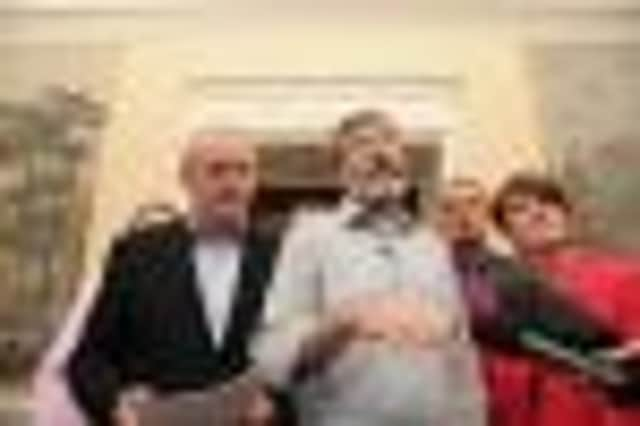Mid-Ulster election exposes impoverished politics


If a week is a long time in politics, as the Wilsonian cliché goes, then it’s an eternity in Westminster by-elections. Seven days after the Lib Dems held on to Eastleigh, voters in Mid-Ulster will today go to the polls to elect a successor to Sinn Fein’s Martin McGuinness.
The two by-elections could hardly be more different: McGuinness, Deputy First Minister of Northern Ireland at Stormont, resigned his Westminster seat as part of a policy of ending “double jobbing”, not because he lied about a traffic offence; the incumbent party’s candidate, Francie Molloy, is overwhelming favourite and, unlike a week ago in Eastleigh, there will be few commentators divining the future of British politics by reading electoral runes left behind by the denizens of Tyrone’s dreary steeples.
Advertisement
Hide AdAdvertisement
Hide AdThe main story in Mid-Ulster has been the candidates, not their parties. Molloy and his main challenger, unionist Nigel Lutton, are indelibly linked in Northern Ireland’s grisly past: in 2007, DUP MP David Simpson accused Molloy of involvement in the killing of Lutton’s father, Frederick, by the IRA, more than 30 years ago. Molloy firmly denies the claims, which were made under parliamentary privilege. Meanwhile, Joey Lutton, the unionist candidate’s uncle, was jailed for a 1976 Ulster Volunteer Force murder.
Francie Molloy has been a member of the Stormont assembly since it was established in 1998. Lutton is running with the backing of all the main unionist parties in Northern Ireland, the Democratic Unionists, the Ulster Unionists and the anti-power sharing Traditional Unionist Voice. Last week, the unionist refused to appear alongside his Sinn Fein counterpart on the BBC Northern Ireland political discussion show, The View. In the end, only two of the names on today’s ballot paper took part in the televised debate: Patsy McGlone, of the Social Democratic and Labour Party, and his Alliance counterpart, Eric Bullick. Neither has a chance of taking the seat.
And yet, despite so much bad blood, the campaign in Mid-Ulster has been a sedate affair. Lutton has been a remarkably quiescent candidate, laying out little in terms of policy. Molloy has made predictable noises about wanting “to carry on the work done by Martin McGuinness and my other colleagues in Sinn Fein”. There is no Ukip-like option for voters to punish their power-sharing rulers, the Democratic Unionists and Sinn Fein.
The irony of a political campaign that has largely ignored core political issues – jobs, the economy, and health – is that Mid-Ulster is a constituency with more than its fair share of problems. The Irish housing boom was not confined to the southern side of the border, and the collapse in construction has hit Mid-Ulster hard. Between 2007 and 2008, joblessness in the area increased by 45 per cent. Dungannon and Cookstown have recorded the highest levels of emigration in Northern Ireland, according to figures released by the Department of Finance.
None of the candidates standing in Mid-Ulster are proposing solutions to these concerns. Indeed, some of their political superiors believe that Northern Irish voters are not really bothered about such bagatelles as the lack of jobs or the cost of living. “I don’t think you’ve ever had a situation in Northern Ireland where people vote for a particular candidate because of their position on abortion, gay marriage, euthanasia, the death penalty. I think people have tended over the years to vote orange and green,” Ulster Unionist leader Mike Nesbitt told the Belfast Newsletter recently.
Nesbitt has paid a hefty price for his support for a single unionist candidate in Mid-Ulster. Two of his party’s most capable Assembly members, John McCallister and Basil McCrea, resigned in protest.
But unionist unity in Mid Ulster is a boon to DUP leader Peter Robinson. The absence of an avowedly DUP candidate has allowed Northern Ireland’s First Minister to take a back seat in the campaign, avoiding any uncomfortable confrontations with his republican partners in power at Stormont. While Sinn Fein and the DUP have both been keen to dampen the obvious narrative of the election – Lutton/Molloy and the unresolved past in Mid-Ulster, and Northern Ireland – neither party has been willing to substitute sectarian politics for actual policies. The result is a hollow, predictable campaign that mimics the reality of life at Stormont, where once sworn enemies are now happily ensconced together in ministerial office. The occasional sharp-tongued quarrel aside, neither paramour is willing to upset their union by proposing a radical shake-up of the affairs of state. But politics, and policies, is what Northern Ireland needs most. Unemployment remains stubbornly high, at around 8 per cent. Some of the most deprived wards in the UK are in Northern Ireland. The war in Northern Ireland may be over, but an impoverished peace is fertile soil for a fresh crop of street fighters. Earlier this week, police in Derry foiled a potentially deadly mortar attack by dissident republicans. The bulk of the loyalists that took to the streets to protest Belfast city council’s decision to fly the union flag on designated days, rather all year round, hailed from working class areas where employment is scarce and educational attainment low.
While psephologists pore over the result of today’s vote in Mid-Ulster, it’s the campaign itself that says most about the state of Northern Irish politics: nothing to see here, move along folks.